| | |||||||||||||||||||||||||
| |||||||||||||||||||||||||
This lists parties that won seats. See the complete results below. | |||||||||||||||||||||||||
This lists parties that won seats. See the complete results below. | |||||||||||||||||||||||||
 |
|---|
Parliamentary elections were held in Burundi on 23 July 2010. [1] [2] The opposition parties boycotted the election after also boycotting the presidential election. [3]
Contents
The ruling National Council for the Defense of Democracy – Forces for the Defense of Democracy won 81 of the 106 seats, while the Union for National Progress gained 17 seats. Another smaller party won five seats, while the remaining three seats are reserved for the Twa minority. [4] Pie Ntavyohanyuma was re-elected as Speaker. Mo-Mamo Karerwa was elected as first deputy Speaker and Francois Kabura as second deputy Speaker. [5]

